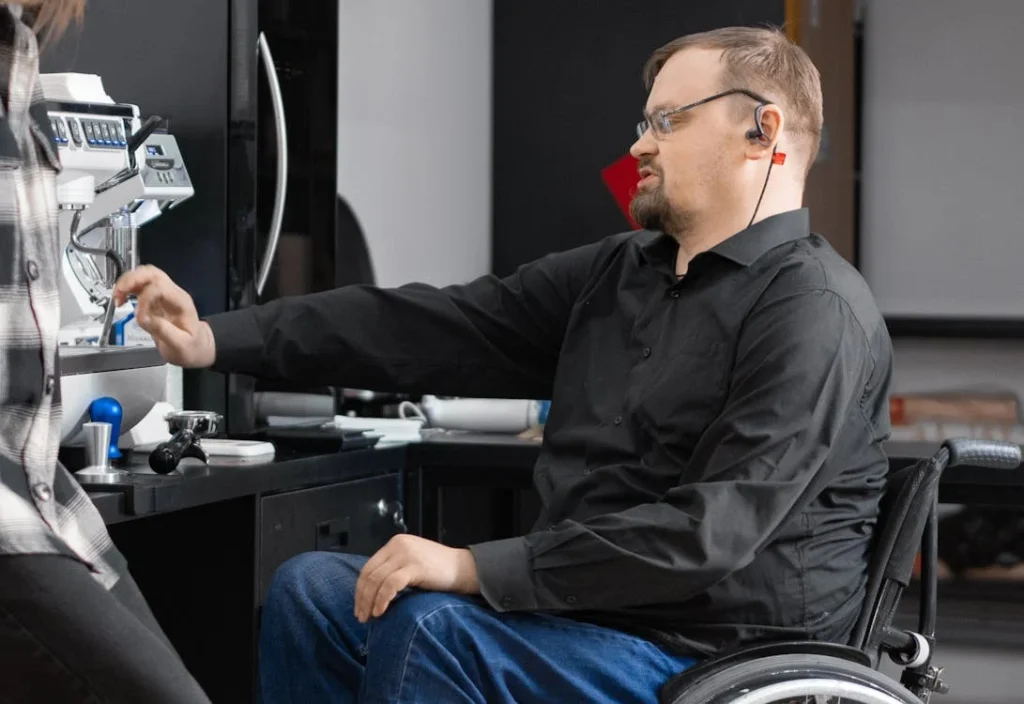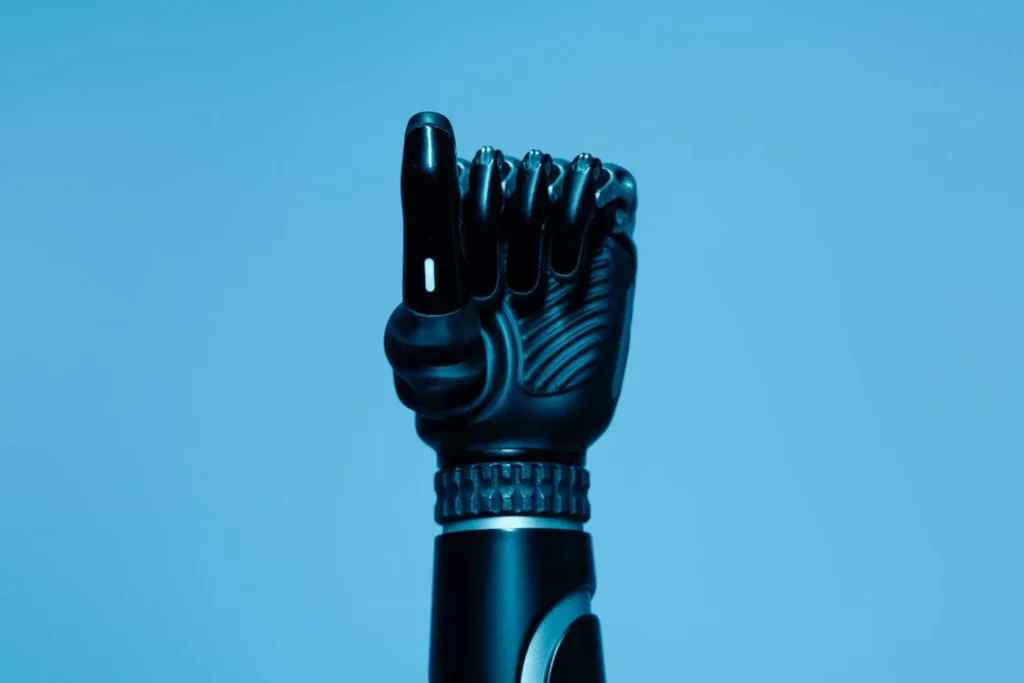In India, people with disabilities often face challenges when looking for jobs, especially in the private sector. Even though laws exist to protect their rights, many companies still do not fully understand or follow them. As a result, many qualified and talented individuals struggle to find and keep jobs that match their skills.
The government has taken several steps to ensure that people with disabilities get fair opportunities in the workplace. Laws such as the Rights of Persons with Disabilities (RPwD) Act, 2016, have been introduced to create a more inclusive work environment. However, there is still a long way to go in making private companies fully inclusive and accessible.

Legal Protections for Persons with Disabilities in Private Sector Employment
India has made significant progress in recognizing and protecting the rights of persons with disabilities, particularly in employment. The Rights of Persons with Disabilities (RPwD) Act, 2016, is the primary law governing this area.
This Act replaced the older Persons with Disabilities (Equal Opportunities, Protection of Rights and Full Participation) Act, 1995, and introduced stronger protections to ensure fair treatment in both public and private sector jobs.
What the RPwD Act Says About Employment
The RPwD Act, 2016, lays down clear rules to prevent discrimination against persons with disabilities in hiring, working conditions, promotions, and dismissals. It applies to both government and private sector jobs, ensuring that individuals with disabilities have an equal chance to work in a supportive environment.
Employers are required to provide reasonable accommodations, meaning they must make necessary changes to the workplace or work processes so that employees with disabilities can perform their jobs effectively.
One of the most important aspects of the Act is the reservation of jobs. In government jobs, 4% of vacancies are reserved for persons with disabilities.
While private companies are not legally required to follow this quota, they are encouraged to adopt inclusive hiring practices.
Many large companies and multinational corporations have started to include people with disabilities in their workforce, recognizing the benefits of a diverse and inclusive team.
Another crucial part of the RPwD Act is the prohibition of discrimination. Employers cannot deny someone a job or a promotion solely because of their disability.
If a person with a disability is qualified for a position, they should be given the same opportunity as any other candidate. If a company fails to comply with these rules, the affected employee or job seeker has the right to take legal action.
Workplace Accessibility and Reasonable Accommodation
For persons with disabilities to work effectively, the workplace itself must be accessible. The RPwD Act requires companies to make physical and digital workplaces more inclusive.
This includes installing ramps, elevators with Braille buttons, accessible washrooms, and providing assistive technology like screen readers for visually impaired employees.
Employers must also provide reasonable accommodation, which means they should make necessary adjustments to ensure a person with a disability can perform their job well.
This could include offering flexible work hours, providing sign language interpreters for meetings, or allowing remote work options for individuals who may struggle with commuting.
The idea is not to lower work standards but to create an environment where employees with disabilities can thrive just like anyone else.
Unfortunately, many companies still hesitate to make these changes, often due to a lack of awareness or misconceptions about the cost of accessibility modifications.
However, several studies show that making workplaces more accessible benefits everyone, not just persons with disabilities. For example, flexible work arrangements and ergonomic office designs improve productivity for all employees.
Challenges in Implementation
Despite strong legal protections, many persons with disabilities still struggle to find jobs in the private sector. One major reason is lack of awareness among employers.
Many companies are unaware of the legal requirements or do not know how to implement them effectively. As a result, persons with disabilities often face barriers even before they get a chance to prove their skills.
Another significant challenge is attitudinal bias. Some employers assume that hiring a person with a disability will be a burden or that they will not be as productive as other employees.
These misconceptions lead to fewer job opportunities for people with disabilities, even when they are fully qualified for the role.
Additionally, many workplaces in India are still physically inaccessible. Offices without ramps, elevators, or accessible restrooms make it difficult for persons with disabilities to work comfortably.
Similarly, digital accessibility remains a concern, as many company websites and online job portals are not designed to be easily navigable for persons with visual or hearing impairments.
While laws like the RPwD Act provide a strong framework, enforcement remains weak. Many private companies do not actively report their disability inclusion policies, and there are few penalties for non-compliance.
To improve the situation, stronger monitoring mechanisms and better incentives for companies to hire persons with disabilities are needed.

Responsibilities of Private Sector Employers Towards Persons with Disabilities
Creating an inclusive work environment is not just a legal obligation but also a moral and strategic decision for private sector companies.
Employers play a crucial role in ensuring that persons with disabilities have fair access to opportunities, receive the necessary support, and feel valued in their workplaces.
Ensuring Equal Opportunities in Hiring
One of the first steps employers must take is to provide equal opportunities in recruitment. Many companies unknowingly create hiring processes that exclude persons with disabilities.
For example, job postings may contain vague language that discourages applicants with disabilities, or the interview process may not be accessible to all candidates.
To promote inclusivity, companies should ensure their job descriptions focus on skills and competencies rather than physical abilities unless absolutely necessary.
If a certain physical requirement is included in a job role, employers should assess whether reasonable accommodations can be made.
For example, if a role involves working with computers, assistive technology like screen readers can help a visually impaired employee perform the job just as effectively as anyone else.
Employers must also make their recruitment process more accessible. This means offering alternative formats for job applications, such as audio versions or accessible online forms for persons with visual impairments.
Interview venues should be wheelchair-friendly, and virtual interview platforms should be accessible to candidates who use assistive devices.
If needed, companies should also provide sign language interpreters or allow written responses instead of verbal interviews for persons with speech or hearing impairments.
Providing Workplace Adjustments and Support
Once a person with a disability is hired, the next important step is ensuring they have the necessary support to perform their job well.
The concept of reasonable accommodation requires companies to make minor adjustments that enable employees with disabilities to work efficiently.
For employees with mobility impairments, this could mean adjusting office layouts, installing ramps, and ensuring desks are at a suitable height.
For persons with hearing impairments, providing video captions, speech-to-text software, or sign language interpreters can make communication more effective.
Visually impaired employees might require Braille documents, screen reading software, or tactile markers to navigate their workspace easily.
Flexibility in work arrangements can also make a big difference. Allowing remote work options or flexible hours can help persons with disabilities manage their work-life balance better, especially if they have health conditions requiring regular medical attention.
Some companies have successfully implemented job-sharing programs, where two employees divide a role’s responsibilities to ensure more manageable workloads.
Building an Inclusive Work Culture
Beyond physical accommodations, private sector employers must focus on changing workplace attitudes towards disability. Many employees may not have prior experience working alongside persons with disabilities, leading to unintentional biases or misunderstandings.
Companies can address this by organizing disability awareness training for their staff. These programs help employees understand different types of disabilities, the challenges individuals may face, and how to communicate and collaborate effectively.
Sensitization training can also challenge common misconceptions, such as the idea that persons with disabilities are less productive or require constant assistance.
Employers should also establish mentorship programs where experienced employees can support and guide their colleagues with disabilities.
Creating employee resource groups (ERGs) focused on disability inclusion can provide a safe space for employees to discuss their challenges and suggest workplace improvements.
Protecting Employees from Discrimination
Even with the best policies in place, persons with disabilities may still face discrimination or unfair treatment at work. This could include being denied promotions, being paid less than their colleagues for the same work, or being excluded from important projects.
To prevent this, companies must have strong anti-discrimination policies in place and ensure that all employees understand them.
Establishing a grievance redressal mechanism is essential. Employees should have a clear and confidential way to report discrimination or accessibility issues without fear of retaliation.
Companies should also assign disability inclusion officers who can oversee compliance with disability policies and act as a point of contact for employees seeking support.
Beyond individual company policies, industry-wide initiatives can also drive change. Many companies are now joining networks that promote disability inclusion, such as the Equal Opportunity Awards and Diversity Hiring Programs.
Partnering with organizations that specialize in disability employment can help businesses recruit talent more effectively while also ensuring that best practices in accessibility and inclusion are followed.
The Business Case for Disability Inclusion
While the moral and legal reasons for hiring persons with disabilities are clear, businesses also benefit from having an inclusive workforce.
Studies show that diverse workplaces foster innovation, improve productivity, and enhance employee morale. Employees with disabilities bring unique perspectives, problem-solving skills, and resilience that can drive business success.
Additionally, companies that prioritize disability inclusion enhance their brand reputation and appeal to a broader customer base.
Many consumers prefer to support businesses that demonstrate social responsibility, and hiring persons with disabilities can strengthen a company’s corporate social responsibility (CSR) initiatives.
Companies that make their workplaces accessible often see long-term financial benefits as well. Improved workplace design, flexible work arrangements, and assistive technologies do not just help employees with disabilities but improve the overall efficiency and satisfaction of the entire workforce.

How Persons with Disabilities Can Advocate for Their Rights in the Workplace
Even with legal protections and corporate policies in place, persons with disabilities often need to advocate for themselves to ensure they receive fair treatment at work.
Understanding one’s rights, effectively communicating needs, and seeking support when necessary can make a significant difference in achieving workplace equality.
Knowing Your Legal Rights
The first step to advocating for yourself is understanding the laws that protect you. The Rights of Persons with Disabilities (RPwD) Act, 2016, guarantees protection against discrimination in employment and ensures reasonable accommodations in the workplace.
Under this law, no employer can deny a job to a qualified individual simply because of their disability. If a job requires adjustments, the employer is obligated to provide them unless it causes undue hardship to the company.
It is also important to be aware of any company policies on diversity and inclusion.
Many organizations have internal guidelines on how they support employees with disabilities, including accessibility measures, flexible work arrangements, and complaint mechanisms in case of discrimination.
Employees should familiarize themselves with these policies and use them to their advantage when requesting accommodations.
Requesting Reasonable Accommodation
A common challenge many persons with disabilities face is the fear of speaking up about their needs.
Some employees worry that requesting accommodations may make them seem like a burden or could impact their job security. However, reasonable accommodations are a right, not a favor.
When requesting an accommodation, it helps to clearly explain how a specific change will improve work performance. Instead of just stating the need, employees can provide examples of how assistive tools or adjustments will enhance productivity.
For instance, an employee with a visual impairment could explain how screen-reading software would allow them to complete tasks more efficiently.
Similarly, a person with a mobility impairment might highlight how an adjustable workstation would improve comfort and efficiency.
Approaching HR or a manager with a well-prepared request can also be beneficial. This includes outlining the specific accommodation needed, potential solutions, and even cost-effective alternatives.
Some accommodations require minimal investment but make a significant difference in an employee’s ability to perform their job.
Speaking Up Against Discrimination
Despite legal protections, workplace discrimination still exists in many forms. This can include being overlooked for promotions, facing workplace harassment, or being assigned tasks that do not match one’s skill level.
If an employee experiences discrimination, it is essential to document incidents, including dates, conversations, and any actions taken by management. Keeping a record strengthens the case if legal action becomes necessary.
Many companies have internal grievance mechanisms where employees can report discrimination confidentially. Speaking to HR, a supervisor, or a designated disability officer can help resolve issues internally.
If a company fails to act, employees have the right to file complaints with the Chief Commissioner for Persons with Disabilities (CCPD) or take legal action under the RPwD Act.
Being part of disability advocacy groups or employee resource groups can also provide additional support. These networks offer guidance, legal advice, and emotional support for individuals facing workplace discrimination.
Building a Support Network
Self-advocacy is easier when individuals have a strong support system. Connecting with mentors, colleagues, and disability rights organizations can help persons with disabilities navigate workplace challenges.
Many companies now have employee-led disability groups, where members share experiences, provide advice, and push for better inclusion policies.
Outside of the workplace, several NGOs and advocacy groups assist persons with disabilities in securing their rights.
Organizations like NCPEDP (National Centre for Promotion of Employment for Disabled People) and Enable India work to promote disability inclusion in employment and can offer legal and career guidance.
Focusing on Career Growth and Development
Advocating for one’s rights should not stop at basic accessibility. Persons with disabilities should also focus on career growth and long-term development.
Seeking professional training, upskilling through courses, and networking within one’s industry can open doors to better opportunities. Many companies now provide inclusive leadership programs to help employees with disabilities advance to higher positions.
Employees can also ask for mentorship and leadership training within their companies. Demonstrating initiative and a commitment to career growth can challenge workplace biases and show that persons with disabilities are just as capable as anyone else.

The Role of Society and Businesses in Promoting Disability Inclusion
While laws and self-advocacy play a crucial role in ensuring equal opportunities for persons with disabilities, real change happens when society and businesses actively work toward inclusion.
Employers, policymakers, and the general public must shift their mindset from seeing disability as a limitation to recognizing the immense potential that persons with disabilities bring to the workforce.
Changing Societal Attitudes Toward Disability
One of the biggest barriers to employment for persons with disabilities is societal perception. In India, disability has long been associated with dependency rather than capability.
Many families, employers, and even educators assume that persons with disabilities cannot work efficiently, which leads to fewer opportunities and discouragement at an early stage.
The media plays a significant role in shaping public perception. Often, persons with disabilities are portrayed as objects of pity rather than as individuals with skills, ambitions, and potential.
To change this, positive representation in films, advertisements, and news stories is essential. Stories of successful professionals with disabilities should be highlighted to challenge stereotypes and inspire both employers and job seekers.
Educational institutions must also take responsibility by ensuring inclusive education. Schools and universities should be equipped with accessible infrastructure and trained staff who can support students with disabilities.
If more persons with disabilities receive quality education and skill development, they will be better prepared for the workforce, increasing their chances of securing meaningful jobs.
How Businesses Can Lead the Change
The private sector has a powerful influence in shaping employment trends. When businesses actively promote disability inclusion, they not only comply with legal requirements but also gain a more diverse and innovative workforce.
Several multinational corporations have recognized the value of hiring persons with disabilities and have taken steps to make their workplaces inclusive.
A major step businesses can take is implementing inclusive hiring practices.
This means ensuring that job descriptions do not discourage applicants with disabilities, making recruitment processes accessible, and training hiring managers to evaluate candidates based on skills rather than physical abilities.
Companies can also benefit from partnering with disability employment agencies.
Organizations like Omnify Prosthetics and Robobionics work to bridge the gap between employers and job seekers with disabilities. By collaborating with such organizations, businesses can tap into a talent pool that is often overlooked.
Economic Benefits of Disability Inclusion
Many employers hesitate to hire persons with disabilities due to the misconception that accommodations are expensive or that productivity will be lower. However, research shows that inclusive companies outperform their competitors in several ways.
Workplaces that prioritize accessibility and diversity often see higher employee satisfaction, lower turnover rates, and increased innovation.
Employees with disabilities bring unique problem-solving skills, adaptability, and creativity—qualities that are highly valuable in any industry.
Additionally, businesses that are inclusive of persons with disabilities can expand their customer base. In India alone, millions of people live with disabilities, and their families are likely to support brands that demonstrate social responsibility.
By making workplaces, products, and services more accessible, businesses can attract a loyal customer base while also fulfilling their corporate social responsibility (CSR) commitments.
Creating Policies That Drive Inclusion
For real change to happen, businesses need clear policies and accountability measures. This includes having a disability inclusion policy, conducting regular accessibility audits, and creating employee resource groups to support workers with disabilities.
Companies can also introduce disability hiring targets, much like gender diversity targets. While private sector employers are not legally required to reserve jobs for persons with disabilities, setting internal goals can encourage more inclusive recruitment practices.
It is equally important to train all employees on disability inclusion. Sensitization programs help break down biases and create a work culture where everyone feels valued.
When colleagues understand how to interact respectfully and support their coworkers with disabilities, the workplace becomes more inclusive and collaborative.

Steps India Needs to Take to Strengthen Disability Inclusion in Private Employment
While India has made progress in protecting the rights of persons with disabilities in employment, there is still a long way to go.
Many companies remain unaware of their responsibilities, workplace accessibility remains a challenge, and enforcement of disability rights laws is inconsistent. To build a truly inclusive workforce, several key changes must take place at both policy and corporate levels.
Stronger Enforcement of the RPwD Act, 2016
The Rights of Persons with Disabilities (RPwD) Act, 2016 is a powerful piece of legislation, but its impact is often limited due to weak enforcement.
Many private companies do not actively implement the law’s provisions, such as making reasonable accommodations or preventing workplace discrimination.
Government agencies must take a more active role in monitoring compliance, ensuring that companies are meeting accessibility and hiring standards.
A major step would be to require private sector companies to publicly report their disability hiring data and workplace inclusion policies.
Just as companies report gender diversity metrics, disability inclusion should become a standard part of corporate reporting. Transparency will create accountability and encourage businesses to take disability inclusion seriously.
Additionally, stronger penalties should be imposed on companies that fail to provide reasonable accommodations or discriminate against employees with disabilities.
Currently, the penalties under the RPwD Act are not strict enough to deter non-compliance. Clearer consequences would encourage businesses to prioritize accessibility and fair hiring practices.
Encouraging Private Sector Participation Through Incentives
Many companies hesitate to hire persons with disabilities due to concerns about costs or productivity. The government can address this by offering tax benefits, subsidies, or financial incentives to private sector companies that actively hire and support persons with disabilities.
For example, businesses that employ a certain percentage of persons with disabilities could receive tax breaks or government funding to improve workplace accessibility.
Companies investing in assistive technologies, such as screen readers or wheelchair-accessible workstations, could receive grants or subsidies to offset costs. Such incentives would encourage more businesses to prioritize disability inclusion.
Another powerful strategy is public recognition of disability-friendly companies. Awards, certifications, and media coverage for inclusive employers would inspire other companies to follow suit.
Many businesses value their corporate reputation, and being recognized as a leader in disability inclusion can enhance brand image and attract socially conscious consumers.
Expanding Accessibility Standards in Workplaces
A major barrier to employment for persons with disabilities is physical and digital inaccessibility. Many office buildings still lack wheelchair ramps, accessible restrooms, and proper signage for persons with visual impairments.
Similarly, many corporate websites and digital platforms are not designed to be accessible to people with disabilities, limiting job search opportunities.
To address this, the government should set stricter accessibility standards for private companies. Workplace accessibility should not be an afterthought—it should be a legal requirement for businesses of a certain size.
New office buildings should be mandated to follow universal design principles, ensuring that all employees, regardless of disability, can navigate the space comfortably.
Digital accessibility must also be prioritized. Company websites, job portals, and internal employee platforms should comply with Web Content Accessibility Guidelines (WCAG) so that persons with disabilities can apply for jobs and access workplace resources without barriers.
Changing Social Attitudes Toward Disability in Employment
Beyond legal and corporate changes, India needs a cultural shift in how disability is perceived in the workplace. Many employers still hold outdated beliefs that persons with disabilities are not as capable or productive as their non-disabled counterparts.
This bias often prevents companies from even considering candidates with disabilities for job opportunities.
To change this mindset, businesses must invest in workplace disability awareness programs. These programs should educate employees and managers on the abilities of persons with disabilities, challenge stereotypes, and highlight success stories of professionals with disabilities.
Encouraging open conversations about disability in the workplace can help remove stigma and create a more accepting environment.
Public campaigns and media representation also play a crucial role. Featuring successful professionals with disabilities in mainstream media can inspire both job seekers and employers to embrace inclusivity.
When businesses and society at large recognize the value that persons with disabilities bring to the workforce, hiring biases will begin to fade.
Strengthening Vocational Training and Skill Development
One of the biggest obstacles to employment for persons with disabilities is the lack of accessible education and vocational training. Many mainstream training programs are not designed with disability inclusion in mind, leaving persons with disabilities with fewer job-ready skills.
The government and private sector should work together to create inclusive skill development programs. This includes offering technical training in fields like IT, finance, and engineering, as well as vocational programs tailored to different disabilities.
Companies can partner with organizations that specialize in disability training to create customized internship and apprenticeship programs for persons with disabilities.
Incorporating assistive technology in education and training is also crucial.
Providing accessible learning materials, sign language interpretation, and screen readers in vocational training programs will ensure that persons with disabilities can develop the skills needed for today’s job market.

The Role of Technology in Improving Employment Opportunities for Persons with Disabilities
Technology has become a game-changer in making workplaces more accessible and inclusive for persons with disabilities.
From assistive devices to artificial intelligence-driven solutions, advancements in technology are helping bridge the gap between disability and employment.
As businesses in India continue to embrace digital transformation, leveraging technology for disability inclusion can create new job opportunities and enhance workplace productivity.
Assistive Technology for Workplace Accessibility
One of the most significant ways technology is helping persons with disabilities in employment is through assistive devices and software.
These tools enable individuals to perform their tasks independently and efficiently, removing barriers that would otherwise prevent them from thriving in the workplace.
For persons with visual impairments, screen readers, Braille displays, and voice-assisted technology allow them to navigate computers and access digital content.
Software such as JAWS (Job Access With Speech) and NVDA (NonVisual Desktop Access) help visually impaired employees read documents, send emails, and browse the internet with ease.
Similarly, OCR (Optical Character Recognition) tools convert printed text into speech, enabling visually impaired professionals to read printed documents.
Persons with hearing impairments benefit from real-time captioning, speech-to-text software, and video conferencing platforms with built-in sign language interpretation.
AI-powered applications like Ava and Google’s Live Transcribe provide instant subtitles for meetings and conversations, ensuring that employees with hearing loss can fully participate in discussions.
For employees with mobility impairments, speech recognition software, adaptive keyboards, and eye-tracking technology provide alternative ways to interact with computers.
Voice-controlled software such as Dragon NaturallySpeaking enables hands-free typing, while ergonomic workstations and motorized wheelchairs help create a comfortable and accessible office setup.
Remote Work and Digital Inclusion
The rise of remote work and digital collaboration tools has significantly improved employment opportunities for persons with disabilities.
Many individuals who previously faced challenges commuting to an office due to inaccessible public transportation or physical barriers can now work effectively from home.
Companies that adopt hybrid work models and flexible work arrangements make it easier for persons with disabilities to maintain a work-life balance.
Cloud-based platforms like Microsoft Teams, Zoom, and Google Workspace allow employees to collaborate, attend meetings, and complete tasks without being physically present in an office.
However, to ensure full digital inclusion, businesses must prioritize accessibility in their digital tools and platforms.
This means ensuring that websites, internal portals, and HR systems comply with Web Content Accessibility Guidelines (WCAG) and are fully usable by employees with disabilities.
Many companies still overlook digital accessibility, making it difficult for persons with disabilities to apply for jobs, complete work assignments, or participate in training programs.
AI and Automation in Disability Employment
Artificial intelligence (AI) and automation are also creating new employment possibilities for persons with disabilities. AI-driven hiring tools can help eliminate bias in recruitment by focusing on a candidate’s skills and qualifications rather than their physical abilities.
Instead of relying on traditional face-to-face interviews, AI-based hiring platforms can assess job applicants through skill-based tests and remote evaluations, ensuring a fair selection process.
AI-powered chatbots and virtual assistants can assist employees with disabilities in navigating workplace resources.
For instance, visually impaired employees can use voice-activated virtual assistants to schedule meetings, retrieve company documents, or send messages.
Similarly, AI-powered translation tools can provide instant sign language interpretation for deaf employees, making workplace communication more seamless.
Automation is also helping individuals with disabilities access new job roles that were previously challenging. Tasks that involve repetitive manual labor can now be automated, allowing employees with mobility impairments to focus on higher-value work.
Industries such as customer service, data analysis, and digital marketing are increasingly leveraging AI and automation, creating more job opportunities for persons with disabilities.
Inclusive Hiring Through Digital Platforms
Technology is also playing a critical role in connecting persons with disabilities to job opportunities. Many organizations and job portals now specialize in disability employment, making it easier for companies to hire diverse talent.
Platforms like Enable India, BarrierBreak, and the NCPEDP’s job portal provide a space for employers to find qualified candidates with disabilities.
LinkedIn and other professional networking sites have also introduced features that allow job seekers to highlight accessibility needs and employers to indicate their disability-friendly hiring practices.
These platforms help job seekers with disabilities find companies that actively support inclusion and accessibility.
Bridging the Digital Divide
Despite these technological advancements, one major challenge remains: the digital divide. Many persons with disabilities in India, particularly in rural areas, lack access to the internet, assistive devices, or digital literacy training.
Without proper infrastructure and education, these individuals are unable to benefit from the employment opportunities created by technology.
To bridge this gap, the government and private sector must work together to provide affordable assistive technology, digital skills training, and accessible online education programs.
Expanding internet access, offering subsidized assistive devices, and integrating accessibility training into mainstream education can empower more persons with disabilities to enter the workforce.

The Future of Disability Inclusion in India’s Private Sector
India is at a crucial turning point when it comes to disability inclusion in the private sector.
While progress has been made, there is still a long way to go to ensure that persons with disabilities have equal access to employment opportunities, workplace accommodations, and career growth.
The future of disability inclusion will depend on a collective effort from businesses, policymakers, advocacy groups, and society as a whole.
Shifting Corporate Mindsets Toward Inclusion
For true change to happen, companies must move beyond compliance and embrace inclusion as a core business strategy. Many businesses still see hiring persons with disabilities as a corporate social responsibility (CSR) initiative rather than a long-term investment in talent.
However, research has consistently shown that diverse workplaces lead to higher innovation, productivity, and employee satisfaction.
As companies compete in a rapidly changing global economy, disability inclusion can provide a competitive advantage. Organizations that actively promote an inclusive culture are more likely to attract top talent, improve customer loyalty, and build a stronger brand reputation.
Customers and investors are increasingly supporting businesses that demonstrate social responsibility, and companies that fail to embrace diversity risk being left behind.
To drive this shift, leadership commitment is essential. When CEOs and senior executives champion disability inclusion, it sets the tone for the entire organization.
Businesses must move beyond symbolic gestures and implement real, measurable actions such as setting hiring targets for persons with disabilities, investing in accessibility, and holding leadership accountable for progress.
Technology-Driven Inclusion Will Become the Norm
As India continues to embrace digital transformation, technology will play an even greater role in improving employment opportunities for persons with disabilities.
Future workplaces will see increased adoption of AI-powered accessibility tools, virtual reality (VR) training programs, and adaptive workspaces designed to accommodate employees of all abilities.
Remote work, which became widely accepted during the pandemic, will likely remain a permanent option for many employees, allowing persons with disabilities greater flexibility in choosing jobs that suit their needs.
Companies that invest in accessible digital infrastructure will have a greater ability to attract and retain disabled talent.
Furthermore, as more businesses adopt automation and artificial intelligence, traditional barriers to employment will decrease.
AI-driven recruitment processes that focus on skills rather than physical abilities will create more equitable hiring practices, while automation will open up new roles for persons with disabilities in industries previously seen as inaccessible.
Strengthening Education and Workforce Training
The future of disability inclusion in the private sector is also linked to better education and vocational training opportunities.
Many persons with disabilities still struggle to find jobs because they lack access to skill development programs tailored to their needs.
Expanding inclusive education, vocational training, and digital literacy programs will be key to ensuring that more persons with disabilities can enter the workforce.
Businesses can play a major role by partnering with disability organizations and educational institutions to provide internships, apprenticeships, and mentorship programs.
Companies that actively support skill-building for persons with disabilities will not only strengthen their own workforce but also contribute to a more inclusive economy.
Policy Reforms and Stronger Implementation of Laws
While India has strong disability rights laws, better enforcement mechanisms are needed to ensure that private companies comply with inclusion requirements.
The government must take steps to improve monitoring, reporting, and enforcement of workplace accessibility standards and anti-discrimination policies.
Stronger collaboration between government agencies, private businesses, and advocacy groups will help identify gaps in implementation and create solutions that drive real impact.
Incentives such as tax benefits, grants, and public recognition for inclusive employers will encourage more businesses to prioritize hiring persons with disabilities.
A More Inclusive and Empowered Workforce
Ultimately, the future of disability inclusion in India’s private sector depends on a shift in mindset—from seeing disability as a limitation to recognizing it as a source of strength.
Persons with disabilities bring resilience, problem-solving skills, and unique perspectives that contribute to business success.
By embracing inclusion, companies are not just following the law—they are unlocking a diverse pool of talent, fostering innovation, and creating a fairer society.
With stronger policies, greater awareness, technological advancements, and committed leadership, India has the opportunity to become a global leader in disability-inclusive employment.
Conclusion
The rights of persons with disabilities in private sector employment in India have come a long way, but there is still work to be done. While the Rights of Persons with Disabilities (RPwD) Act, 2016 provides strong legal protections, implementation remains inconsistent. Many companies are still unaware of their responsibilities, and workplace accessibility continues to be a challenge.
However, progress is being made. Businesses that embrace inclusion as a strategy, invest in accessibility, and leverage technology are seeing the benefits of a diverse workforce. Assistive technology, AI-driven hiring tools, and remote work opportunities are helping remove traditional barriers to employment.
For meaningful change, stronger enforcement of laws, corporate accountability, and investment in skill development are essential. The private sector, government, and advocacy groups must work together to create a future where persons with disabilities have equal opportunities to thrive in the workplace.
Disability inclusion is not just about compliance—it is about unlocking potential, fostering innovation, and building a more equitable society. By prioritizing accessibility and fair hiring practices, Indian businesses can lead the way in creating a workforce where everyone, regardless of ability, has the chance to succeed.



